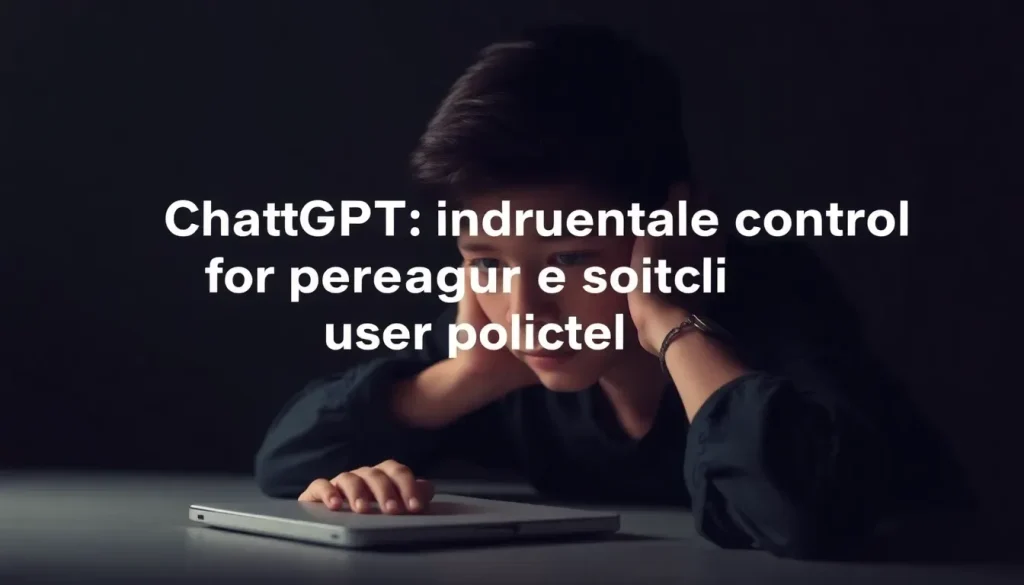ChatGPT introduces parental controls for teenage user protection

As technology continues to evolve, so do the concerns of parents regarding their children's online safety. With the rise of AI-driven platforms like ChatGPT, OpenAI has taken significant steps to address these concerns. In a recent rollout, they introduced parental controls designed to create a safer digital environment for teenage users. This article explores these new features, their implications, and how they can be beneficial in protecting young users.
- What is ChatGPT and its significance for young users?
- New parental controls for ChatGPT: An overview
- Why is parental guidance crucial in the digital age?
- How to implement parental controls on ChatGPT
- Understanding privacy and safety features
- Resources for parents
- Should teenagers have parental controls?
What is ChatGPT and its significance for young users?
ChatGPT is an advanced AI language model developed by OpenAI that can engage in conversations, answer questions, and assist with various tasks. Its capabilities range from providing homework help to generating creative writing prompts. However, as its popularity grows, so does the necessity for safeguarding its younger users.
The significance of ChatGPT for teenagers lies not only in its educational potential but also in the risks associated with unsupervised usage. The platform can expose users to inappropriate content or harmful discussions, making it essential for parents to understand its functionalities and risks.
New parental controls for ChatGPT: An overview
In response to growing concerns regarding the safety of minors online, OpenAI has implemented a series of parental controls for ChatGPT. This initiative follows tragic incidents, including a lawsuit involving a teenager who allegedly used the platform to plan self-harm. Here’s what parents need to know about these new features:
- Account Linking: Parents can link their ChatGPT accounts with those of their children, enabling a customized experience tailored to the needs of younger users.
- Quiet Hours: Parents have the ability to establish quiet hours, ensuring that the platform is not accessible during specific times.
- Content Restrictions: There's an option to restrict access to certain functionalities such as voice control and image generation, which may not be suitable for all age groups.
- Privacy Considerations: While parents can monitor settings, they can't view their child's chat history, preserving the privacy of their conversations.
- Enhanced Protections: The system automatically blocks discussions involving graphic content, sexual themes, and harmful viral challenges.
- Alert Mechanism: If ChatGPT detects potential signs of self-harming behavior, it can alert linked parents, and in extreme cases, authorities may be notified.
Why is parental guidance crucial in the digital age?
As teenagers increasingly turn to digital platforms for information and social interaction, parental guidance becomes crucial for several reasons:
- Exposure to Risks: The internet is rife with inappropriate material that can negatively impact young minds, making supervision necessary.
- Cognitive Development: Adolescents are still developing critical thinking and decision-making skills, which can be influenced by online interactions.
- Cyberbullying: The anonymity of online platforms can lead to harmful interactions, and parental oversight can help mitigate these risks.
- Digital Literacy: Parents can play a role in teaching their children how to navigate the internet safely and responsibly.
How to implement parental controls on ChatGPT
Setting up parental controls on ChatGPT is designed to be straightforward. Here are the steps parents should follow:
- Create or log into your OpenAI account.
- Navigate to the parental control section on the settings page.
- Link your account with your child's ChatGPT account.
- Customize settings according to your preferences, including restricting content and establishing quiet hours.
- Regularly review settings and adjust them as necessary to adapt to your child's changing needs.
Understanding privacy and safety features
While implementing parental controls, it's vital to understand the balance between monitoring and respecting privacy. OpenAI's approach emphasizes:
- Privacy Preservation: Parents do not have access to their child’s chat history, which is essential for maintaining trust.
- Safety Alerts: The alert system for self-harm behaviors acts as an additional safety net for parents.
- Continuous Improvement: OpenAI plans to refine these controls based on feedback from experts and users, ensuring they remain effective and relevant.
Resources for parents
OpenAI has created a dedicated resource page for parents interested in learning more about ChatGPT and how to keep their children safe while using it. This page includes:
- Detailed explanations about how ChatGPT functions.
- A comprehensive overview of available parental controls.
- Practical tips on how teenagers can utilize ChatGPT for academic and creative purposes.
For more information, visit the new parent resource page.
Should teenagers have parental controls?
The debate around whether teenagers should have parental controls on platforms like ChatGPT has been ongoing. Advocates for parental controls argue that they are essential for protecting young users from potential harm. On the other hand, some believe that such restrictions may hinder the development of independence in teenagers.
Ultimately, the decision should be based on individual circumstances, including the maturity level of the teenager and their understanding of digital safety. OpenAI’s parental controls offer a balanced approach, enabling parents to maintain oversight while encouraging responsible use of technology.
As these developments continue, it’s essential for parents to remain engaged in their children's online activities, fostering an environment where safety and learning coexist harmoniously.
To gain a deeper insight into the introduction of these parental controls, you can watch this informative video:




Leave a Reply